Ridiculous/Hilarious/Terrible/Cool (22 page)
Read Ridiculous/Hilarious/Terrible/Cool Online
Authors: Elisha Cooper
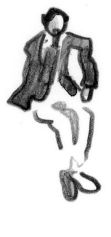
But as hard as Foer may be trying not to look his age, the students know that he's their contemporary. They look at him with wide-eyed admiration as he gives them kind advice about writing and life.
Afterward, they line up to have their books signed,
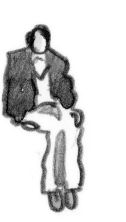 copies clutched to their breasts. As they get closer to him, the fact of Foer is tantalizing. Here he is
copies clutched to their breasts. As they get closer to him, the fact of Foer is tantalizing. Here he is
, real
. They can almost reach out and put him in their pocket. After getting her book signed, Maya walks out of the recital hall, face glowing.

, real
. They can almost reach out and put him in their pocket. After getting her book signed, Maya walks out of the recital hall, face glowing.
“He's so crushable!” she chirps, popping a piece of gum into her mouth. Though it is not clear whether she's referring to Foer's size or his cuteness, it's probably the latter. She heads outside the front door and sits on one of the benches in the sun.
Maya's in a lively mood. She looks tan, healthy. Something else is different too. Over break Maya went to Arizona to visit one of her sisters. Her sister's best friend's husband is a hairdresser and her sister has a pool and one day everyone sat around the pool and had their hair cut. Maya got bangs.
“I think it's worth it. It's working pretty good!” She giggles, scrunching up her nose. “I like it better. Freer. Ready for summer. I don't know what that means!”
Maya is freer in other ways. There's no more boyfriend. Just before flying west, the relationship with Ben went limp. It may not have helped that around this time, he cut his shaggy hair into a mullet.
“We weren't compatible. We just didn't get along that well as a couple. We clashed. He's very stubborn. So am I,” Maya says, sucking her cheeks inward. “It was frustrating.”
She stops and starts, circling around what exactly went wrong.
“Fine while it lasted, but it was kind of like, it's better this way . . . .
“We're better off as friends . . . .
“I don't know. I don't know . . . .
“I think it may . . . It was
everything
.”
everything
.”
Maya stops chewing her gum. She talks about how she and Ben had gotten very serious very quickly. He wanted sex. She wanted to wait, or at least to take things slower. It didn't feel
right
. After she had mono, after she got better, he got impatient and angry all the time. He wasn't very nice about it. As she talks about her decision to break up with Ben, she speaks with some relief. She's looking forward to making new friends in New York or California.
right
. After she had mono, after she got better, he got impatient and angry all the time. He wasn't very nice about it. As she talks about her decision to break up with Ben, she speaks with some relief. She's looking forward to making new friends in New York or California.
Maya hasn't decided where she's going to college. Last night she talked late into the night with her parents. They support whatever decision she makes (though some of Maya's teachers shake their heads when they hear she hasn't automatically accepted Stanford). She knows she's lucky to have such a choice. She knows Stanford is prestigious. But at Stanford she would be a student. At NYU she'd be an actor, and she's always wanted to be an actor.
“I don't know,” she says, though it's hard to hear her through the clump of hair that she's pulled into her mouth.
Whatever Maya decides, wherever she goes, tuition will be astronomical. Upwards of forty thousand dollars a yearâan impossible number. To earn spending money and buy a new computer, Maya recently got a job at Nordstrom. She'll be working in the teen department. As she mentions this, she claps.
“I feel like such a girl!”
After her interview last week she came home and complained to her mother about how tedious the job would be, how much of an act she'd have to put on.
“I'm like, â
Argh
. I don't belong here.'”
Argh
. I don't belong here.'”
Her mother replied, “âWelcome to the real world, Maya.'”
So before Maya heads off to college (wherever that is), she's looking at a spring and summer of selling fashion to teens.
She cries, “My dream come true!”
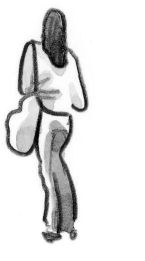
Mr. Dyson's students from the Zulu seminar are back from South Africa. As they walk through the halls, they look exhausted.
The flight was long, the trip full. Visiting townships, meeting students from Vukuzakhe High School, painting murals. They even met the Zulu King. His name was Goodwill Zwelithini. He was a big rambling guy who wore linen pants. The students were disappointed that the king's clothes weren't cooler. When they met him, they had to take off their shoes and shout stuff like
“You're the great elephant!”
“You're the great elephant!”
One morning they saw a real elephant. After waking under a star-pricked sky, they drove to Hluhluwe-Umfolozi Game Reserve. They headed out in the day's first light and a lone bull elephant walked directly across the path in front of them. He smelled rank.
The students had an overnight stay with their Vukuzakhe High host families. Everyone was apprehensive. It was after dark when Mr. Dyson dropped the students off in the winding streets of the impoverished Umlazi Township. But in the morning, all the students gathered back at the high school, filled with stories. They were somehow bigger now through their connection to high school students halfway across the world.
Next fall, the students from Vukuzakhe High are coming to Payton.
On a second-floor hallway in city hall, a janitor pushes a buffer over the marble. It's six o'clock, after work. The janitor is cranking Aerosmith on a boom box; the wailing of “Dream On” nearly drowns out his polishing, and the meeting taking place next door in the city council chambers.
The meeting is for the YMCA youth council. Twenty-two students sprawl in a semicircle of leather chairs around cloth-covered tables, facing the podium and listening to their youth mayor: Daniel Patton, wearing a Penn sweatshirt.
Daniel did not get into Harvard. The rejection came in an e-mail that began with some perfunctory
“I am sorry to inform you . . . ”
Initially, Daniel felt pretty bad. He didn't film his reaction. But the bad feeling improved because, on the same day,
“I am sorry to inform you . . . ”
Initially, Daniel felt pretty bad. He didn't film his reaction. But the bad feeling improved because, on the same day,
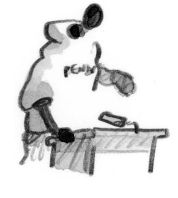
Daniel was accepted by the University of Pennsylvania. Penn is the best college that Daniel got into, so Daniel will go to Penn. He says he's excited to be going to such a prestigious school, an Ivy League school. He says he's moving on. It's not like there was anything he could do about his rejection from Harvard, so there was no point moping. But, at least initially, not getting into the school of his choice was a slap. His expectations were derailed and had to be reconfigured, and quickly. One of the first things Daniel did when he didn't get into Harvard was go out and buy himself the red and blue Penn sweatshirt.
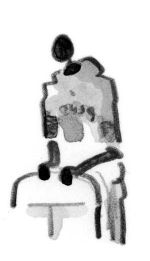
Complementing the clothing of his future alma mater, Daniel today is wearing brand-new white sneakers, dress socks, and khaki pants. The youth mayor is handing the seat of power to next year's youth mayor.
“Has everyone who wants to be nominated for mayor been nominated?” Daniel drawls into the microphone, gavel held loosely in his right hand.
After nominations are made, a legislative aide to the real mayor addresses the youth council. The aide is old and white.
The students are young and black.
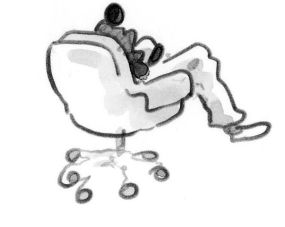
“Have any of you attended a city council meeting? ” the aide asks, hands in pockets, rocking on his toes. Nobody raises their hands.
“How boring was it?!” the aide jokes.
He proceeds to bore the students for forty-five minutes about how boring the city council is.
Daniel swivels in his leather chair, face drawn up in a responsive smile. The students on either side of him have their hands under the table and are texting on their cell phones. After ten minutes of smiling at the mayoral aide, Daniel pulls out his Treo and starts tapping away too. Then the aide stops, and Daniel lopes up to the podium and takes the gavel.
The youth council starts debating a resolution: Wal-Mart, good or bad. A vote is taken and it's decided: Wal-Mart, bad. As youth mayor, Daniel does not get to vote, though he is the one who must count the votes of those who do.
“Watch number twelve!” shout the mothers of the Francis W. Parker School girls' soccer team. The mothers are thin, which combined with their oversized sunglasses, makes them look like hungry bugs. But they are smart bugs. Number 12 is Emily Harris and she
should
be watched.
should
be watched.
Other books
The Pizza Mystery by Gertrude Chandler Warner
Amanda Scott by Prince of Danger
Trapped by Melody Carlson
Blatino Str8 Trade: Alpha Thugs Downlow (Ultimate Str8 Trade Book 1) by Marcus Greene
Taken By Storm by Emmie Mears
City of Dreams and Nightmare by Ian Whates
Once Upon A Time (Historical Romance) by Constance O'Banyon
Free to Love (The Tribe MC: Chase of Prey Book 3) by West, Heather
Stealing Mercury (Arena Dogs Book 1) by Charlee Allden